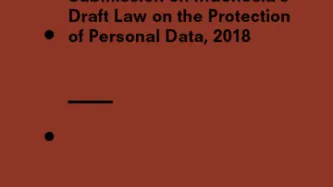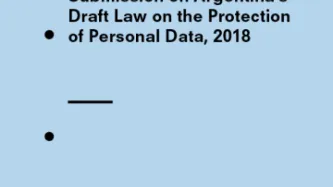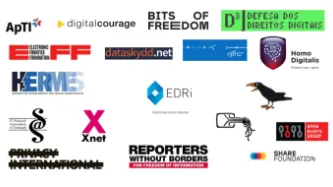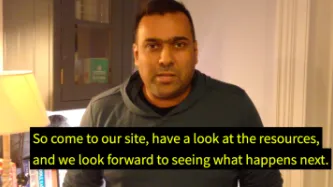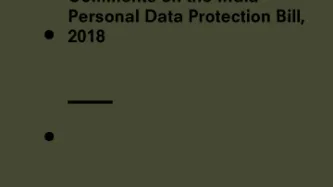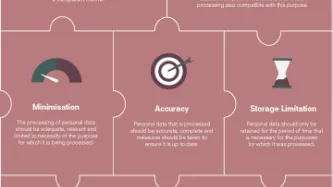Search
Content type: News & Analysis
The notorious Clearview AI first rose to prominence in January 2020, following a New York Times report. Put simply, Clearview AI is a facial recognition company that uses an “automated image scraper”, a tool that searches the web and collects any images that it detects as containing human faces. All these faces are then run through its proprietary facial recognition software, to build a gigantic biometrics database.
What this means is that without your knowledge, your face could be stored…
Content type: Press release
Privacy International (PI), together with Hermes Center for Transparency and Digital Human Rights, Homo Digitalis and noyb - the European Center for Digital Rights, has today filed a series of legal complaints against Clearview AI, Inc. The facial recognition company claims to have “the largest known database of 3+ billion facial images”. The complaints were submitted to data protection regulators in France, Austria, Italy, Greece and the United Kingdom.
As our complaints detail, Clearview AI…
Content type: News & Analysis
The report on disinformation by the UN Special Rapporteur on the promotion and protection of the right to freedom of opinion and expression follows a growing trend by international bodies (including the Organization of American States and the European Commission) to assess and regulate the global phenomenon that is disinformation.
The report strongly links the spread of disinformation with the gratuitous data collection and profiling techniques utilised by the online…
Content type: Advocacy
This report is presented by TEDIC (Technology and Community Association) and Privacy International (PI). TEDIC is a non-governmental, non-profit organization, based in Asunción, that promotes and defends human rights on the Internet and extends its networking to Latin America. PI is a London based human rights organization that works globally at the intersection of modern technologies and rights.
TEDIC and PI wish to express some concerns about the protection and promotion of the right to…
Content type: News & Analysis
Uganda's Presidential election in January 2021 resulted in the incumbent President Museveni winning his sixth term in office, having held power for 35 years. The election took place amidst a global pandemic and the run up to election day was fraught. Violence left dozens dead and hundreds more arrested, including the opposition candidate Bobi Wine. Mass rallies and in person campaign meetings were banned due to Covid restrictions and political parties in Uganda were encouraged to conduct “…
Content type: News & Analysis
Unwanted Witness’ research into Safeboda highlighted the company’s failure to comply with some of the law's core data protection principles, with a number of implications for the exercise of data subject rights. The enforcement action against Safeboda by National Information Technology Authority, Uganda (NITA-U) requires the company to make fundamental changes to how they handle people's personal data in order to comply with the Data Protection and Privacy Act, 2019.
This first landmark…
Content type: Advocacy
Background
Giphy is a searchable database for Graphic Interchange Format (‘GIF’) files, stickers, emojis, text, videos and Arcade (remixable video games). This database can be queried through the Giphy search engine, either via its main website (giphy.com), its API or its SDK. Content obtained can then be shared via their URL or be integrated in another service such as a website or an app. Well known integrations of Giphy include messaging services like Whatsapp, Slack,…
Content type: Long Read
Political parties depend on data to drive their campaigns, from deciding where to hold rallies, which campaign messages to focus on in which area, and how to target supporters, undecided voters and non-supporters, including with ads on social media. Political parties increasingly hire private companies to do the bulk of this work, and our primary concern is how these companies use personal data to “profile” people and drive election campaigning.
As part of PI’s programme of work on Defending…
Content type: Advocacy
Since 2014 the Indonesian Ministry of Communication and Informatics (MOCI) has been proposing that the Parliament passes a comprehensive data protection law. A first draft data protection law was issued by the Government for public comment in 2015 but no progress was made, and then in early 2018, the Indonesian Government issued a new draft personal data protection law.
While these renewed efforts have positive intentions, a number of concerns ought to be addressed with the aim of…
Content type: Advocacy
In September 2018, the National Executive sent the proposed Data Protection Bill to the National Congress. The proposed law was directed to the Senate and it will be considered by two commissions: the Commission of Constitutional Affairs (Comision de Asuntos Constitucionales) and the Commission of Rights and Guarantees (Comision de Derechos y Garantías).
Privacy International welcomes the continued efforts by Argentina to provide protections for the right to privacy, already enshrined in the…
Content type: Advocacy
Este informe es presentado por Derechos Digitales, Ciudadano Inteligente, Fundación ProAcceso y Privacy International. Derechos Digitales es una organización no gubernamental de defensa, promoción y desarrollo de los derechos humanos en el entorno digital. Ciudadano Inteligente es una organización dedicada a fortalecer la democracia y reducir la desigualdad a través de la transparencia y la participación ciudadana. Fundación ProAcceso se dedica a la defensa del derecho de acceso a la…
Content type: Press release
Consumer groups, NGOs and industry call jointly for the Council of the EU to advance ePrivacy reform
On Monday 3 December, a coalition of more than 30 consumer groups, NGOs and industry representatives sent a letter to EU Ministers and the Council of the EU calling for the conclusion of the negotiations on the reform of the ePrivacy legislation.
The letter was sent prior to yesterday's (4 December) meeting in the TTE Council, with signatories sharing concerns over the slow progress of the negotiations in the Council of the EU despite the repeated scandals that demonstrate the clear and…
Content type: News & Analysis
We found this here.
The European Union’s new privacy law, the General Data Protection Regulation, or GDPR, is being tested across Europe. The first GDPR privacy case in Romania began with an investigation that was published on November 5 about a corruption scandal involving a politician and his close relationships to a company being investigated for fraud. The Romanian data protection authority (ANSPDCP) sent a series of questions to the journalists who authored the article and asked for…
Content type: Advocacy
Privacy International, European Digital Rights, and the Association for Technology and Internet (ApTI) together with 15 other digital rights organisations sent a letter on Monday 21 November 2018, to the European Data Protection Board (EDPB), with copies to the Romanian Data Protection Authority (ANSPDCP), and the European Commission, asking for the General Data Protection Regulation (GDPR) not to be misused in order to threaten media freedom in Romania.
Shortly after a journalistic…
Content type: News & Analysis
Email addresses
Acxiom: [email protected]
Criteo: [email protected]
Equifax: [email protected]
Experian: [email protected]
Oracle: https://oracle.ethicspointvp.com/custom/oracle/dp/en/form_data.asp
Quantcast: [email protected] cc: [email protected]
Tapad: [email protected]
Letter for Acxiom and Oracle
subject line: Right to Erasure Request
I am concerned your company exploits my data.
In accordance with my right[s] under the General Data…
Content type: News & Analysis
Our team wanted to see how data companies that are not used to being in the public spotlight would respond to people exercising their data rights. You have the right under the EU General Data Protection Regulation ("GDPR") to demand that companies operating in the European Union (either because they are based here or target their products or services to individuals in the EU) delete your data within one month. We wrote to seven companies and requested that they delete our data, and we've made…
Content type: Press release
Today, Privacy International has filed complaints against seven data brokers (Acxiom, Oracle), ad-tech companies (Criteo, Quantcast, Tapad), and credit referencing agencies (Equifax, Experian) with data protection authorities in France, Ireland, and the UK. Privacy International urges the data protection authorities to investigate these companies and to protect individuals from the mass exploitation of their data.
Our complaints target companies that, despite exploiting the data of millions of…
Content type: Advocacy
Today, Privacy International has filed complaints against seven data brokers (Acxiom, Oracle), ad-tech companies (Criteo, Quantcast, Tapad), and credit referencing agencies (Equifax, Experian) with data protection authorities in France, Ireland, and the UK.
It’s been more than five months since the EU’s General Data Protection Regulation (GDPR) came into effect. Fundamentally, the GDPR strengthens rights of individuals with regard to the protection of their data, imposes more…
Content type: Advocacy
Today, Privacy International has filed complaints against seven data brokers (Acxiom, Oracle), ad-tech companies (Criteo, Quantcast, Tapad), and credit referencing agencies (Equifax, Experian) with data protection authorities in France, Ireland, and the UK.
It’s been more than five months since the EU’s General Data Protection Regulation (GDPR) came into effect. Fundamentally, the GDPR strengthens rights of individuals with regard to the protection of their data, imposes more…
Content type: Long Read
It’s 15:10 pm on April 18, 2018. I’m in the Privacy International office, reading a news story on the use of facial recognition in Thailand. On April 20, at 21:10, I clicked on a CNN Money Exclusive on my phone. At 11:45 on May 11, 2018, I read a story on USA Today about Facebook knowing when teen users are feeling insecure.
How do I know all of this? Because I asked an advertising company called Quantcast for all of the data they have about me.
Most people will have never heard of…
Content type: Advocacy
Privacy International welcomes the effort by the Government of India to reaffirm its commitment to upholding and respecting the right to privacy, and for noting the need to regulate the processing of personal data as essential for the protection of privacy through the adoption of a data protection law.
The urgent need for this legislation has been validated in the Supreme Court decision regarding the Aadhaar Act, which stipulates the need for a robust data protection regime. …
Content type: News & Analysis
Image attribution: By Blue Diamond Gallery CC BY-SA 3.0.
In March 2017, when the UN Human Rights Council requested the High Commissioner for Human Rights to prepare a report on the right to privacy in the digital age, including the responsibility of business enterprises, Cambridge Analytica was an obscure company among others. A year later the data exploitation scandal erupted, leading to plenty of soul searching by politicians in US, UK, Europe and elsewhere, pledges of…
Content type: Advocacy
In parallel to the legislative process initiated by the Kenya Senate in July 2018, a Task Force constituted by the Ministry of Information, Communication and Telecommunication developed a draft Data Protection Bill which it published for consultation in May of this year.
Privacy International and its Kenya Partners, the National Coalition of Human Rights Defenders – Kenya (NCHRD-K), the Centre for Intellectual Property and Information Technology (CIPIT) are pleased to have had the…
Content type: News & Analysis
“The gathering and holding of personal information on computers, data banks, and other devices, whether by public authorities or private individuals or bodies, must be regulated by law.”
- UN Human Rights Committee, General Comment No. 16, 1988
Underpinning the obligations of those who process personal data, both public and private institutions, the grounds on which they may do so, and the rights of individuals, there are various data protection principles…
Content type: Long Read
National and International civil society organisations (CSOs) play vital roles in many aspects of our societies as watchdogs of state powers, as representatives of the voices of the people, as experts to inform and educate an array of stakeholders.
One of our key lessons learned from three decades of work, including 10 years with the Privacy International Networkto build a global privacy movement,promoting and advocating for the highest privacy and data protection safeguards has been…
Content type: Report
Esta parte de "Las Claves para Mejorar la Protección de Datos" proporciona enlaces a recursos adicionales y describe las vías de participación para mejorar el involucramiento de las organizaciones de la sociedad civil en estos temas.
Content type: Report
This part of “The Keys to Data Protection” provides links to further resources and outlines avenues for engagement which we hope will encourage more civil society organisations to engage in policy developments and legal processes on data protection.
Content type: Report
Esta parte de "Las Claves para Mejorar la Protección de Datos" describe los modelos y estructuras, así como los poderes y funciones de una autoridad de supervisión independiente.
Content type: Report
This part of “The Keys to Data Protection” outlines the models and structures as well as powers and functions of an independent supervisory authority, which plays an essential role as an independent oversight and enforcement mechanism of data protection law.








